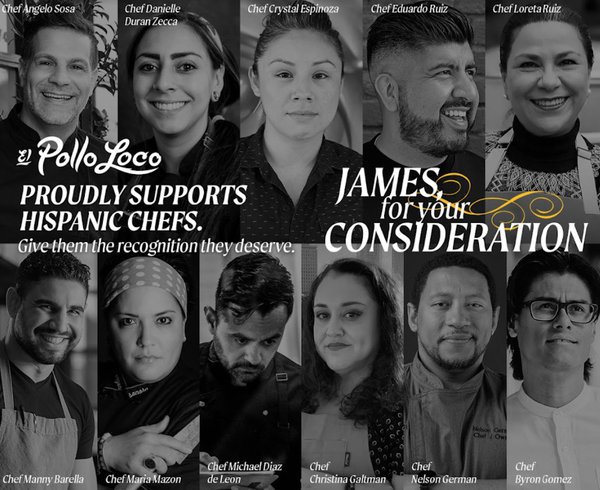
Image above: QSR chain El Pollo Loco's ad. "James" is the
Beard Foundation, asked to consider Hispanic chefs for its Outstanding Chef Award.
If there’s one word that best describes Hispanic consumers, it’s complejo.
That’s complex—and it’s an extreme understatement.
National Hispanic Heritage Month—Sept. 15 through Oct. 15—celebrates Hispanic histories, cultures and
contributions, as explained by this long-form video from insurer Cigna.
But to truly understand Hispanic cultural
complexities—which are not getting simpler given continued immigration to the United States—one needs to dig beyond national and local celebrations.
In its 2021 Hispanic Market
Report, marketing-data provider Claritas notes that Hispanics are by no means a homogeneous group given linguistic and cultural differences.
advertisement
advertisement
“U.S. Hispanics speak many variations of the
Spanish language and like many immigrant cultures, integrate traditions from their countries of origin that influence their decisions such as buying habits,” the report says.
For
purposes of targeting, Claritas’ CultureCode segments Hispanics into five distinct cultural categories. When combined, the first two—Americanizado and Nueva Latina—represent 46% of
Hispanics. They are the least tethered to cultural practices.
The other three categories—AmBi-Cultural, Hispano and Latinaoamericana—are more sensitive about cultural differences
and more prone to speaking at least some Spanish.
Taking Hispanics as one group, they’re 34% more likely than non-Hispanics to watch live television on a cell phone, 18% more likely to
consume streaming video on Amazon Prime and 18% more likely to watch Netflix.
This was not lost on the folks at Tastemade, the digital publisher specializing in food, travel and home design
content. Last September, the company launched the Spanish-language streaming network Tastemade en Español.
“The U.S. Hispanic/Latinx community is a melting pot of many Latin
cultures,” Rubi Chavez, head of marketing at Tastemade, tells Marketing Daily.“Hispanics want to see our culture reflected in marketing to connect us to our communities and to have
equal representation.”
This is a concept that resonates with Mexican QSR chain El Pollo Loco in a National Hispanic Heritage Month campaign created to celebrate Hispanic culinary
talent.
According to a full-page ad for El Pollo Loco in The New York Times food section last week, Hispanics comprise 25.5% of restaurant workers, 20.8% of line cooks and 22.5% of
“executive chefs.” Yet in nearly a decade, the James Beard Foundation hasn’t selected one Hispanic in its annual Outstanding Chef Award.
As part of the “For Your
Consideration” campaign—which includes ads on a digital billboard truck in New York City—El Pollo Loco has offered up the names and stories of 11 “exceptional” Hispanic
chefs for “consideration” by the foundation.
“The Hispanic community is the backbone of the U.S. food industry and yet the country’s ever-growing wealth of Hispanic
culinary talent and contributions continue to be overlooked and underappreciated,” El Pollo Loco president and CEO Bernard Acoca said in a news release.
When it comes to purchasing
groceries, Walmart Supercenter is far and away the most popular choice for Hispanic households, followed by Hispanic grocers, according to Claritas.
As it continues to expand its Fresco y
Más chain, Southeastern Grocers—which also operates Winn-Dixie and Harveys Supermarket—is celebrating National Hispanic Heritage Month with its first cooking competition.
Airing live on Facebook on Oct. 15, the competition will feature four nonprofit organizations competing for a grand prize of $5,000. It will feature MasterChef finalist John Pardo as the
“elite judge” and will take place at the Mariano Moreno Culinary Institute in Miami.
In November, Southeastern will debut two new Fresco y Más locations in Deltona and
Tampa, Florida “to delight customers with a new, authentic Hispanic shopping experience catered to the tastes and preferences of their local communities.”